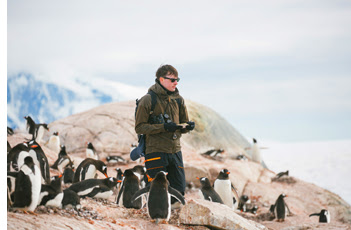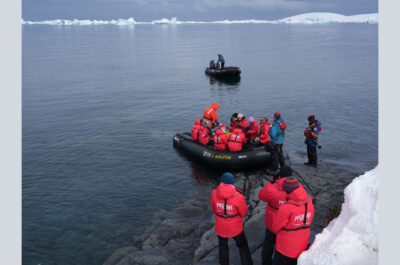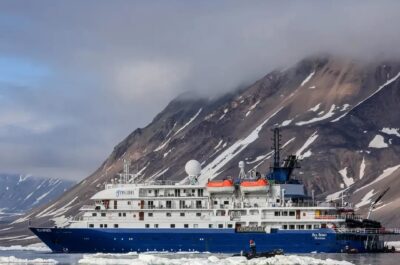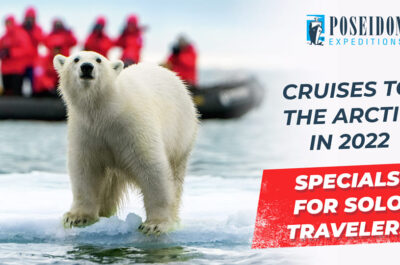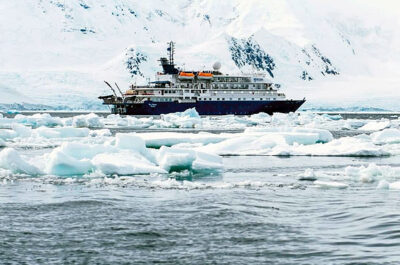During the cruise Poseidon Expeditions helps to both orchestrate an auction to raise money for Oceanites and provide information on Oceanites’ work to generate additional donations from passengers.
PROVIDENCE, RI – Poseidon Expeditions, the specialist in active adventure cruises in the polar latitudes, recently entered into a supportive relationship with the nonprofit organization Oceanites to help monitor and analyze penguin and seabird population changes over time in the Antarctic Peninsula.
This is the first season in Antarctica (2019-2020) that Oceanites and Poseidon are working together. Through an in-kind donation of space on several Poseidon voyages each year, Oceanites (https://oceanites.org/) is able to bring researchers to Antarctica to carry out its work in counting and documenting nesting birds at established sites.
During the cruise Poseidon Expeditions helps to both orchestrate an auction to raise money for Oceanites and provide information on Oceanites’ work to generate additional donations from passengers. In turn, while on a cruise with Poseidon, Oceanites researchers present an evening slide show about their work and the changes they are witnessing in penguin populations and the environment.
“For 25 years Oceanites has been an important partner of the Antarctic scientific community, working on the front line to provide vital statistics on penguin populations at the Antarctic Peninsula,” said Steve Wellmeier of Poseidon Expeditions. “Our passengers really appreciate the opportunity to learn firsthand about penguins and changes affecting various colonies. They return home with a much better understanding of the White Continent and the need to preserve its unique ecosystem.”
Oceanites’ Mapping Application for Penguin Populations and Projected Dynamics (MAPPPD) database launched in October 2016. This database makes publicly available continent-wide Antarctic penguin population data and descriptive information. MAPPPD now comprises data from over 660 sites across the entire Antarctic continent.
“Oceanites’ longstanding credibility promotes a better understanding of the singular issue of our time – adaptation – because Antarctica and its penguins are incubators foretelling our planet’s future,” said Oceanites founder and principal, Ron Naveen. A former Antarctic expedition leader, Naveen began his love affair with birds when he was 14 years old. He became enraptured with penguins and their unique challenge being on the front lines of climate change.
Oceanites uses penguin population trends to focus public attention on climate change ‘winners’ and ‘losers’ and whether penguins – and humans can adapt to a warming future.
“This is the world’s only publicly supported, scientific research initiative in Antarctica,” explains Naveen. The US-based, tax-exempt nonprofit §501(c)(3) organization has been driving science-based conservation under the Antarctic Treaty for more than two decades (since 1994).
Over the years, Oceanites has supported successful efforts to establish both general guidance for all Antarctic visitors and a series of site-specific management guidelines.
“Climate change is real and the most important challenge facing mankind today. We just want more people to get outside and smell the guano and then to become a part of the conversation and solution,” said Naveen.
Following are observations Oceanites has tracked over 1, 713 site visits at 223 data collection stations over 22 seasons in Antarctica:
- Over the past 60 years winter temperatures in Antarctica, the coldest and windiest place on Earth, have risen by 9* F (5*C);
- Gentoo Penguin populations seem to be increasing and increasing their range southward;
- Adelie and Chinstrap Penguin populations seem to be on the decline.
Naveen explains why Antarctica is so important in the understanding of climate change:
- Antarctica is ‘ground zero’ for understanding how a changing climate affects Earth’s living organisms. What happens to Antarctica’s penguins, wildlife, land, ice, and ocean affects us all. Oceanites has inaugurated a major, long-term Climate – Challenge research project that will help distinguish the direct and interactive effects of climate change, fishing, tourism, and national operations in the Antarctic Peninsula, which, in turn, is expected to assist improved environmental management in this vastly warming region;
- Its 5.4 million square miles are the size of the United States and Mexico combined, and equal 10 percent of earth’s land surface;
- During the austral winter, sea ice may double the size of the continent;
- 99 percent of Antarctica is covered by a permanent ice sheet, which averages over a mile in thickness, and in some places is almost three miles thick;
- 80 percent of the world’s ice and 70 percent of the world’s fresh water are locked in this ice pack;
- Antarctica’s surrounding Southern Ocean ecosystem is the largest and most fertile in the world, comprising 13.9 million square miles, equal to 10 percent of the world’s oceans.
Vicky is the co-founder of TravelDailyNews Media Network where she is the Editor-in Chief. She is also responsible for the daily operation and the financial policy. She holds a Bachelor's degree in Tourism Business Administration from the Technical University of Athens and a Master in Business Administration (MBA) from the University of Wales.
She has many years of both academic and industrial experience within the travel industry. She has written/edited numerous articles in various tourism magazines.












